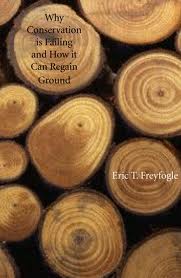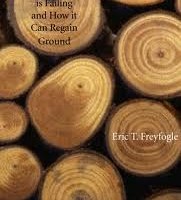Toward a Conservative Conservation Movement, by Tobias J. Lanz
 Why Conservation Is Failing and How It Can Regain Ground, by Eric T. Freyfogle. Yale University Press
Why Conservation Is Failing and How It Can Regain Ground, by Eric T. Freyfogle. Yale University Press
Environmental conservation has moved from the margin to the political mainstream in recent decades. However, despite the high profile and widespread public support of environmental issues, conservation policy has failed to achieve many of its goals. Eric Freyfogle, environmental law and policy professor at the University of Illinois, argues that this is because it has been caught between two extremes—people who love wild animals and wild places and those who want to protect their own individual rights and liberties. This tension has created a fragmented environmental movement and a confused and frustrated public.
This impasse must be overcome if conservation is to be truly effective. In short, conservation requires a communal approach, one Freyfogle terms a “land community” approach that sees environmental problems as more than legal, economic or technical issues, but as cultural ones. History must also be used as a framework to understand how environmental problems evolved and and to comprehend their broader social and ecological impact.
The land community approach is one that Freyfogle derives from the conservationist Aldo Leopold and farmer/writer Wendell Berry. Leopold looked at the broader issue of land use, whereas Berry focuses more on the importance of farm and rural life. But both ground their ideas in human experience, in which people and their relationships to the land are the foundation for sound conservation. Such an approach eschews the radical individualism that has become the basis of American culture as well as the radical environmentalism that has grown in response to it.
Both types of radicalism undermine good conservation in the long run as they work against the common good. Radical individualism uses private property without any recourse to communal or ecological needs. Similarly radical environmentalism desires to create wilderness areas that are as free of human influence as possible. Neither tries to create a cooperative arrangement in which both the land and community can benefit in the long run.
Freyfogle is also critical of the popular concept of sustainability, which can be traced back to the early twentieth century ideas of “sustainable yield” championed by Teddy Roosevelt and Gifford Pinchot. Now, as then, its primary focus is fulfilling only human needs, thus marginalizing any ecological claims. Sustainability is also so vague it can easily be misapplied leading to even greater confusion. This is one reason that business and government use it frequently to justify a whole range of laws and policies—like sustainable growth—that can be detrimental to the environment. The conservation movement would be best served by jettisoning the term entirely.
Conservation cannot be based on abstract or universal concepts. So there is no universal conservation policy, rather myriad approaches, each tailored to the unique social and ecological conditions of a given environment. Good conservation must be based on sound principles, rooted in human experience. First, conservation must provide resources for future generations without compromising the integrity of those resources. Second, individual desires must always be balanced with those of the community. Third,conservation policy must recognize human ignorance, especially our limited scientific knowledge. Prudence and caution are in order. Last, and most importantly, conservation must be an ethical issue, even a religious obligation.
Read the complete article in The Imaginative Conservative
